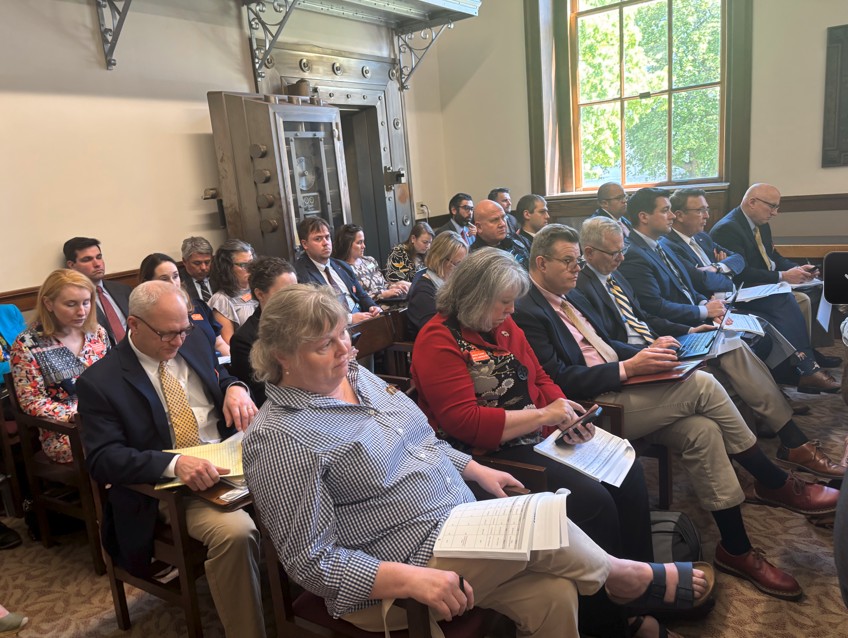By PAULA TRACY, InDepthNH.org
CONCORD – Coos County is likely to be designated a “distressed place-based economy” for the next 20 years, which could help the North Country with economic development.
An amended Senate Bill 180 was recommended to be added into the HB 2 budget by the Senate Finance Committee Tuesday.
The committee also voted to recommend that a tax amnesty program should be offered Dec. 1, 2025 through February 15, 2026 at the cost to administer at $50,000 with projected revenue estimated at $4 million.
Sen. Tim Lang, R-Sanbornton, who made the recommendation, called that a good return on investment.
The committee will be meeting every day this week and next Monday and Tuesday before coming up with a final recommendation list for the budget.
Important to the North County has been Senate Bill 180.
The northern tip of the state is sparsely populated with lots of trees and wildlife, has higher unemployment than the rest of the state, lower wages and outmigration after mills were shuttered over three decades and a destination grand hotel closed in 2011.
Logging is even slowing down as a new form of income – carbon sequestration – grows as a way of making money off the land without cutting most of the trees.
This bill designates Coos County as a distressed place-based economy. It originally required commissioners of state agencies to consult with Coos County commissioners before making regulatory decisions that would affect the financial position of the county but that was amended out of the bill by members of the House Executive Departments and Administration Committee.
Supporters of the measure at public hearings said it may allow for the county to get preferential treatment and has been used in places like Appalachia.
Benoit Lamontagne, who handles business recruitment and retention for the North Country on behalf of the state, said he sees the bill as having positive benefits.
Les Otten, a ski industry entrepreneur who is continuing to try to return The Balsams Resort in Dixville Notch to its past grandeur, remains optimistic in that effort.
He said he was approached by Sen. Dave Rochefort, R-Littleton, about the bill, and Otten said while it is complicated it is good news.
He stressed he remains positive about the prospects of The Balsams’ future though it shuttered in 2011 but noted the policies of the White House has affected a lot of people with a lot of ramifications, certainly to Coos County, as trade and tariff matters are felt closest to the border with Canada.
The bill is sponsored by Rochefort, as co-sponsors including Republican Reps. Sean Durkin, Seth King, Arnold Davis, Mike Ouellet, and James Tierney.
The bill reads that “traditional one-size-fits-all government services systemically disadvantage various sections of the population or economically distressed rural regions.
“Coos County has repeatedly endured significant economic losses and has faced comparatively greater financial impacts and higher unemployment than other counties in the state. Therefore, in an attempt to foster greater economic sustainability for its interdependent industries and to stimulate economic growth in Coos County, the general court recognizes Coos County is a place-based economy that requires collaborative and tailored regulatory decision-making.
Local governments and businesses will see greater success when departments use public-private partnerships to utilize shared knowledge, strengths, and resources to drive solutions. Greater effort is needed to view local governmental jurisdictions as partners to allow for more efficient use of resources and enforcement and avoid inconsistent directives with regional economic conditions,” it reads.
A “place-based economy” in the bill means a tailored economic development response that uses a region’s unique characteristics to create and sustain growth.
“The goal is to improve the quality of life and economic vitality by building on its limited strengths and assets,” it reads.
Phil Sletten, research director for the New Hampshire Fiscal Policy Institute said Coos County stands apart from much of the state in terms of data.
In the 2019-2023 period, the most recent years for which these U.S. Census Bureau data are available, he said the poverty rate in Coos County was 12.9 percent (with a margin of error of +/- 1.9 percentage points).
Coos County’s poverty rate was about 1.75 times higher than the statewide poverty rate of 7.2 percent during 2019-2023.
The median household income in Coos County during 2019-2023 was about $58,000. That is lower than the statewide median household income of $96,000 during this period, and about half of the $114,000 median household income in the state’s highest-income county, Rockingham.
Sletten said the number of employees at worksites based in Coos County declined 1.0 percent between 2018 and 2023, from 11,970 to 11,853, according to data from New Hampshire Employment Security. Employment based in New Hampshire increased 3.6 percent statewide during this period.
From 2008 to 2023, New Hampshire-based employment increased 8.5 percent, but declined 12.6 percent in Coos County. Average weekly wages grew by about the same relative percent during this longer period, but wages remained lower in Coos County. The average weekly wage, including both part-time and full-time work, was $1,432 statewide and $996 in Coos County.
And he noted the cost of buying a single-family house has increased faster, in percentage terms, in Coos County than in any other county in the state since before the COVID-19 pandemic.
From 2018 to 2024, the median single-family house sale price increased 125.7 percent, while the statewide increase was 81.6 percent.
Coos County still had the least expensive single-family house median sale price, however; the $255,000 median sale price was about half of the statewide $514,000 median price during 2024.
“Relative to existing laws focused on the Coos County economy, the State currently has the Coos County Job Creation Tax Credit that offsets Business Profit Tax and Business Enterprise Tax liabilities. In fiscal year 2024, 52 tax filers used this credit, with credit amounts totaling $240,000; both of these figures were increases relative to the prior eight years of this tax credit’s use,” Sletten noted.





